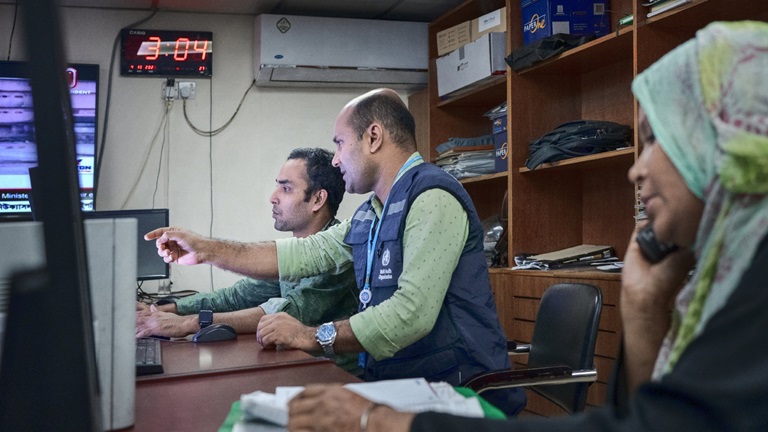
Office of Investigations
WHO Bangladesh Project Officer Md. Jewel Rana, Data Analyst Md. Uddin and Data Analyst Kaniz Fatema at work in the DGHS control room, where dengue related data is monitored and stored, on 4 October 2023.
Misconduct harms the reputation of the World Health Organization.
To detect, prevent and deter misconduct, the Office of Investigations, under the Office of Internal Oversight Services (IOS), conducts fact-based, results-oriented investigations that enhance WHO’s transparency and accountability, while safeguarding the workforce, collaborators and communities where the Organization is present.
The Office of Investigations examines and determines the veracity of allegations about misconduct or other irregularities affecting WHO, its projects, assets or personnel.
Duty to report
WHO’s workforce and collaborators have a duty to report misconduct.
Reports can be made through the Integrity Hotline, which provides a safe, independent mechanism to report allegations of wrongdoing involving WHO’s staff and collaborators.
Reports that come through the hotline are accessible only by IOS, which will then assess the allegations to decide whether to initiate an investigation, in accordance with its mandate. Reports can be made confidentially and anonymously.
The Office of Investigations accepts reports by all individuals, regardless of their contractual situation with the Organization, however only allegations concerning a member of WHO’s workforce, collaborators, assets or programmes are under its jurisdiction and will be investigated pursuant to internal guidelines, policies and procedures.
Reports received by IOS are treated with confidentiality to the extent possible and in accordance with WHO’s policies.
Compliance with an investigation
For its investigations, IOS has the authority to request that WHO’s workforce and collaborators cooperate with and provide information for an investigation. Any attempt to thwart an investigation or non-cooperation may constitute misconduct and result in administrative or disciplinary action.
Investigation oversight
IOS conducts its investigations in accordance with the Uniform Principles and Guidelines for Investigations and relevant WHO regulations, rules, policies, and guidelines, and is guided by practices promulgated by the Representatives of Investigations Services of the United Nations (UNRIAS).
Composition of IOS’s Office of Investigations
The Office of Investigations has four teams, each responsible for investigating an area of suspected misconduct, including:
- Financial misconduct – such as fraud and corruption.
- Abusive conduct and retaliation – harassment, discrimination and abuse of authority.
- Sexual misconduct – sexual exploitation and abuse, and sexual harassment.
- Operational support and data analytics – policy development, intake and preliminary assessment of allegations, quality assurance, statistics and reporting, and support for forensic data analysis.
For more information on IOS investigations, please visit our page on frequently asked questions.
Dashboards
Report wrongdoing
